Harry Potter and the Cursed Child Bewitches Broadway
The world’s most famous wizard stars in the biggest show in New York.
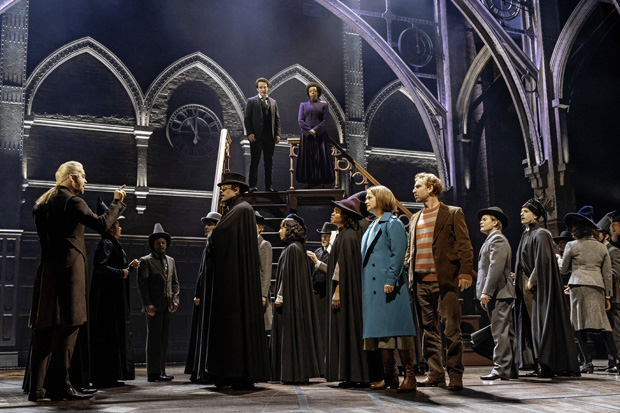
(© Manuel Harlan)
I hope you didn't read Harry Potter and the Cursed Child. Published by Scholastic to look like the eighth installment in J.K. Rowling's megahit series of fantasy novels about Hogwarts School of Witchcraft and Wizardry, the book undoubtedly produces its fair share of gasps and tears when read alone. But Harry Potter and the Cursed Child is a play. It is meant to be seen and heard in the theater. Broadway audiences can now experience Rowling's special brand of shock and awe with 1,600 other Potter fans in the Lyric Theatre, where the two-part drama is now making its North American debut. It is not only the most magical show on Broadway, but the best day I've spent in the theater in a long time.
Some of that comes from my preexisting relationship with the material: Like millions of readers, I bonded with Harry, Ron, and Hermione through seven books as they fought the resurgent forces of Lord Voldemort, a dark wizard seeking to cleanse the magical world of those with "impure blood." I was with them, even as the adults charged with maintaining order routinely disappointed. Rowling's books (authored between 1997 and 2007) feel incredibly prescient today, as authoritarian nativism becomes increasingly popular in the West, blindsiding a hapless liberal establishment. But as so many Broadway carrions prove, nostalgia is not enough: You have to offer something fresh, as Cursed Child marvelously does.
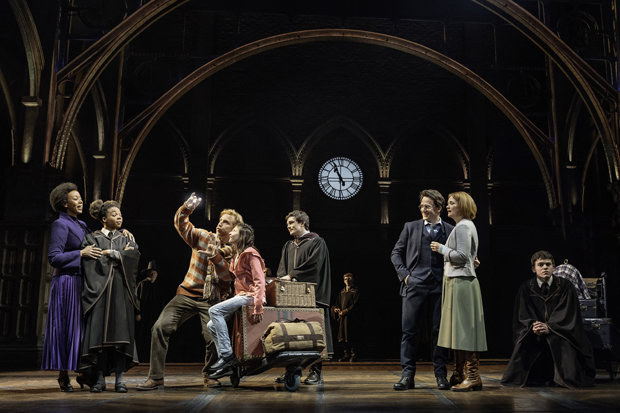
(© Manuel Harlan)
This new play by Jack Thorne (based on an original story by Rowling, Thorne, and director John Tiffany) picks up where the epilogue of the seventh book left off: All grown up, Harry (Jamie Parker) has three children with Ginny Potter, née Weasley (Poppy Miller). Minister of Magic Hermione Granger (Noma Dumezweni) is married to Ron Weasley (Paul Thornley). They send their daughter, Rose (Susan Heyward), off to Hogwarts with Harry and Ginny's middle son, Albus (Sam Clemmett). "I'm a Granger-Weasley, you're a Potter," Rose tells Albus, luxuriating in her hyphenation. "Everyone will want to be friends with us."
But Albus makes an unlikely best friend on the Hogwarts Express: Scorpius Malfoy (Anthony Boyle), son of Harry's old nemesis, Draco (Alex Price). As the years at Hogwarts pass, Albus and Harry's relationship becomes strained, with Albus struggling to live up to his name and questioning his father's legacy. He convinces Scorpius to help him correct one of Harry's historic errors by using a time-turner to go back and save Cedric Diggory (Benjamin Wheelwright), the star student who tragically died during the Triwizard Tournament of Harry's fourth year. Of course, anyone who has seen a Back to the Future movie knows this plan is bound to run into problems.
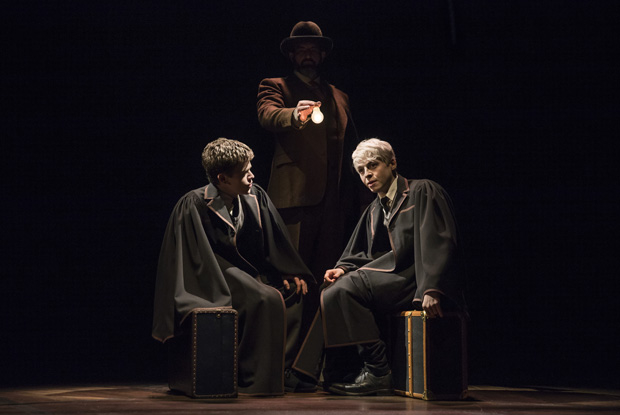
(© Matthew Murphy)
Thorne condenses a heap of exposition, breezing through Albus's first three years at Hogwarts in under 20 minutes. Tiffany stages these fat-free scenes with precision and clarity, creating a vibrant, dynamic world. Christine Jones's cavernous set, which resembles a train station, reinforces this transience. As gorgeous light (by Neil Austin) streams in from a high window, members of the ensemble shuffle across the stage, their robes billowing through Steven Hoggett's lively choreography. Luggage forms a large part of the scenery as a rotating stage keeps everything moving. Tiffany brings an experimental director's resourcefulness to the biggest budget currently on Broadway, resulting in a play that feels lavish, but never wasteful.
Tiffany also exploits cutting-edge stagecraft to maximum effect: While Frozen has one jaw-dropping costume change, Harry Potter has one every few scenes thanks to Katrina Lindsay's detailed and transformable costumes. Finn Ross and Ash Woodward have designed some of the most realistic-looking, head-spinning projections ever deployed onstage. Illusion designer Jamie Harrison holds us in sustained wonder as we constantly ask ourselves, How did they do that?
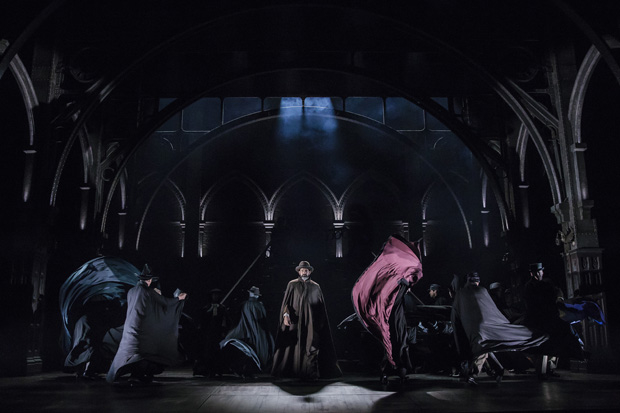
(© Matthew Murphy)
Convincing performances from the 40-person cast sell the magic and earn our emotional investment. This is especially true of Clemmett and Boyle, whose geek bromance becomes as precious as any of the preexisting relationships. We delight at seeing how the original characters have grown into adulthood: Dumezweni delivers a commanding Hermione, Miller an assertive Ginny. Parker and Price's portrayals of uneasy dads Harry and Draco feel completely authentic. Everyone in the cast excels at making the massive Lyric Theatre feel intimate, drawing us into the play's quieter scenes. Despite all their technical wizardry, Thorne and Tiffany succeed by emphasizing character, relationships, and moral complexity — all things theater does well.
In no small part due to this groundbreaking production, The Cursed Child solidifies my belief that J.K. Rowling is our greatest living storyteller. With the novels, she created a story that young readers can grow up with, as Harry and his friends confront increasingly adult problems. The Cursed Child expands that legacy to a new generation (like Harry, many of the original readers of now have children of their own). Far from being pure escapism, The Cursed Child has astute things to say about institutional complacency, elite arrogance, and the repercussions of humiliation — all forces driving our world today. Both relevant and timeless, Harry Potter is the epic of our time and it is thrilling that the theater is a part of that. You don't need to be a professor of divination to know that this show is going to be a big hit.
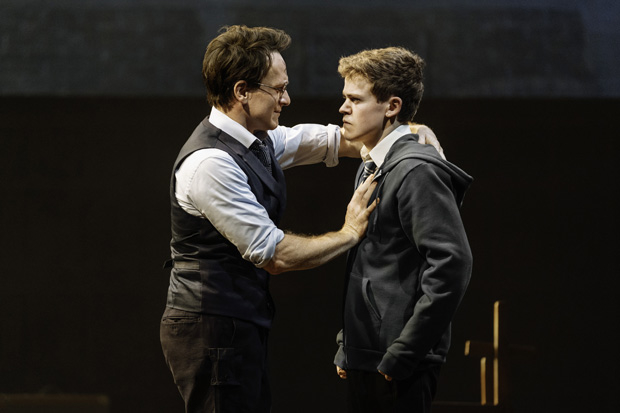
(© Manuel Harlan)











